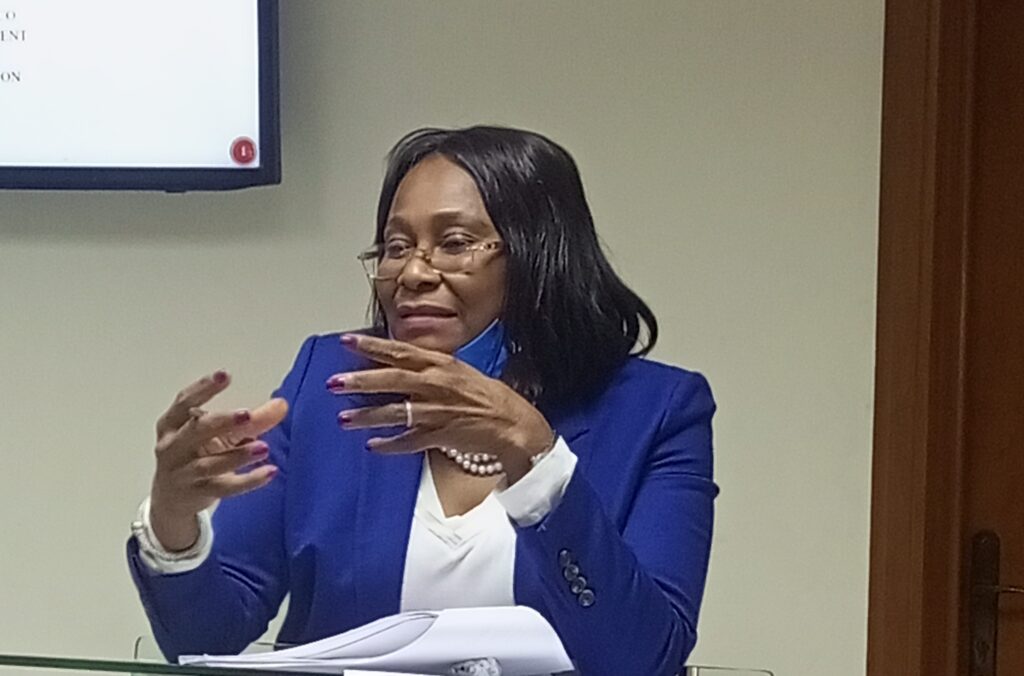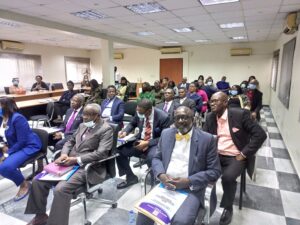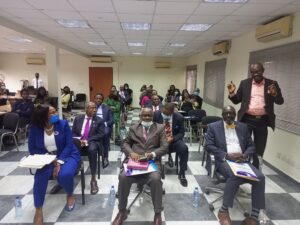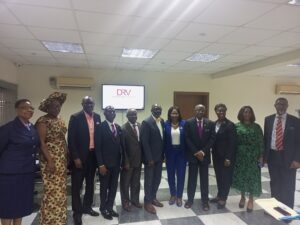The Managing Partner, Doyin Rhodes-Vivour & Co., Mrs. Adedoyin Rhodes-Vivour SAN has advocated the use of Alternative Dispute Resolution (ADR) rather than the conventional Courts to settle maritime disputes in Nigeria.
Rhodes-Vivour who stated this while delivering a paper entitled, “Maritime Dispute Resolution Agreements: A Driver To Speedy Resolution”, at the 11th Practical Maritime Dispute Resolution Seminar 2022 organized by the Maritime Arbitrators Association of Nigeria (MAAN) in Lagos on Wednesday stated that Alternative Dispute Resolution in the maritime sector offers the opportunity of effective, efficient and cost effective alternatives to dispute resolution in the sector.
She observed that ADR should be encouraged by all stakeholders in the industry and with a view to the development of the country as a hub in Africa for international maritime arbitration and ADR services.
X-raying the reasons for maritime disputes, Rhodes-Vivour who is a former President of MAAN pointed out that maritime activities constitute a vital sector of the Nigerian economy adding that given the spate of activities within the sector including that relating to the incoming and outgoing cargoes, maritime disputes were bound to happen.
She also added that apart from cargo related claims, there was the area of deep sea oil exploration activities. According to her, the billion dollar investments in free-trade zones were also bound to increase the level of commercial interactions and potential disputes.
“In addition, the dry ports, i.e the Inland Container Depots (ICDs) are expected to make shipping services more accessible to shippers thus increasing the propensity for disputes. Shippers and the shipping companies regularly interface with the regulatory agencies in the maritime sector including the Nigerian Maritime Administration and Safety Agency, the Nigerian Ports Authority or other regulatory bodies within the Nigerian Maritime industry and as a result of these activities, disputes are bound to arise”, she said.
She explained that maritime disputes were disputes arising or in connection with a ship which includes: cargo claims, charter party dispute, sale/supply dispute, ship building contractual dispute, ship finance, salvage/towage, marine insurance, pollution claims, collision, freight forwarding, customs claims as well as marine border claims.
Speaking on features of maritime disputes, Mrs. Rhodes-Vivour maintained that maritime disputes transversed beyond local frontiers expanding to the international arena saying that often times, they were international in nature.
While noting that time was of the essence, she further submitted that maritime matters were highly technical and very risky even as she said that often times, it involved large sums of money.
She also said that maritime disputes often involved multiple parties (for example the shipper, carrier, owner of ship, charterer, bailee, P&I Club e.t.c), often involved multiple contracts and that most dispute resolution clauses were in standard form contracts e.g Bill of Lading.
Mrs. Rhodes-Vivour went on to state that in shipping, parties in disagreement were often connected by some form of contracts e.g charter party or a contract for services.
She continued, “Dispute also arise where the parties are connected only by the event itself such as a collision or contract damage between a ship and the berth or a third party properties. Shipping disputes can range from simple matters solved quickly through amicable discussion to complex multi-jurisdictional legal action worth millions of dollars.”
Comparing litigation and ADR, she posited that while litigation offered adversarial system, ADR provided amicable settlement of dispute. While the Court appointed judges in the case of litigation, parties had choice of dispute resolvers; litigation was formal and rigid while ADR in informal and flexible.
Speaking further, she submitted that while litigation could be expensive, a lengthy process, imposed decisions that that were supported by reasoned opinions, binding, judgement may be appealed and open to the public, ADR could be less expensive, may be expeditious, mutually acceptable agreements, non binding except arbitration/mediation (consent judgement), awards were not subject to appeal but may be set aside subject to grounds and private and confidential.
Rhodes-Vivour listed the main advantage of arbitration over litigation in the national court to include ease of enforcement of awards insisting that foreign arbitration awards were enforceable in more than 140 countries which were parties to the 1958 New York Convention on the recognition of foreign enforcement of awards. She added neutrality, confidentiality, procedural flexibility, expert Arbitrators , speed and cost as well as finality of awards as other advantages of arbitration.
She also listed the potential disadvantages of arbitration to include: limited powers of an arbitrator and need for recourse to national courts, delays in the court system particularly in some jurisdictions, multi-party and multi-contract dispute as well as awards not binding on the third parties nor establishes a binding legal precedents for future proceedings.
On factors that may influence the type of dispute resolution mechanism for resolving maritime disputes, the former MAAN boss submitted as follows: dispute that involves multiple parties and multiple contacts might be more suitable for litigation or arbitration, where a maritime dispute requires enforcement across many borders or many legal systems, arbitration might be more attractive.
“However, the Singapore Convention is aimed at facilitating international trade and commerce by enabling disputing parties to easily enforce and invoke settlement agreements across borders. Thus businesses will benefit from mediation as an additional dispute resolution option to litigation and arbitration in settling cross-border disputes.
“Where the dispute is in a settled aspect of law and the disputants wish to benefit from an already decided cases or where parties desire to establish legal precedent, litigation might be preferable. Where parties desire to preserve their working relationship or are in a long term relationship/contracts, for example charter parties, less adversarial method are preferable”, she further said.
The Senior Advocate of Nigeria listed some domestic dispute resolution organizations to include: Maritime Arbitrators Association of Nigeria (MAAN), Chartered Institute of Arbitrators (UK) Nigeria branch, Lagos Chamber of Commerce International Arbitration Centre, International Chamber of Commerce Nigeria, Commission on Arbitration and ADR, Lagos Court of Arbitration, International Center for Arbitration and Mediation Abuja, The Multi-Door Courthouses and Negotiation and Conflicts Management Group.
On international dispute resolution organizations, she listed the following: London Maritime Arbitrators Association, London Court of International Arbitration, Permanent Court of Arbitration, International Chamber of Commerce, International Centre for Dispute Resolution, American Association of Arbitrators, Singapore International Centre for Arbitration, Hong Kong international Arbitration Centre, Dubai International Arbitration Centre, Kuala Lumpur Regional Centre for Arbitration among others.
Speaking on some dispute resolution organizations and services they render, she said, “Maritime Arbitrators Association of Nigeria is the only body of maritime arbitration in Nigeria. It was established in 2005 out of the need to ensure that the increasing demand for maritime arbitration in Nigeria is effectively met. It’s membership is composed of Master Mariners, maritime/commercial lawyers, shipping companies and other operators in the maritime industry.
“It acts as an appointing authority, maintains a roll of MAAN Arbitrators and a list of MAAN ‘experts’/assessors/individual experts who have shown an intention and readiness to offer their services for effective dispute resolution as well as provides tailored conferences and seminars.
“Chartered Institute of Arbitrators (UK) Nigeria branch, established in 1915 to provide a membership organization for Arbitrators and ‘to raise the status of arbitration to the dignity of a distinct and recognized position as one of the learned professions.’ The institute is the internationally recognized home for Arbitrators and alternative dispute resolvers. The Nigerian branch is one of the global body’s fastest branches, the only branch in West Africa and one of the five in Africa.
“The Institute provides education and training for arbitrators, mediators and adjudicators. The Chartered Institute of Arbitrators maintains a register of qualified arbitrators and mediators.”
On his part, a former President of MAAN, Dr. Omogbai Omo-Eboh submitted that Alternative Dispute Resolution (ADR) mechanisms were now recognized worldwide as the most efficient and most cost effective means of resolving disputes in any industry particularly the maritime industry.
“We know the constraints with the traditional courts – the Federal High Court and other courts, we know the constraints of litigation which is why ADR is being promoted worldwide now. In any industry, in any business we go into, in any relationship you go into, you must anticipate dispute, there will always be dispute and when there are disputes, they can disrupt that business. In many cases, they can kill relationship, they can end up business even very profitable businesses.
“That is why there has to be an efficient dispute resolution mechanism that any commercial party can come to when there is dispute so that that dispute is properly resolve and the business can go on smoothly and profits can be made”, he declared.
Also speaking, the Deputy Director/Registrar of Ships, Nigerian Maritime Administration and Safety Agency, NIMASA, Mrs. Nneka Obianyor posited that today, ADR was gradually getting institutionalized in most legal systems in the world even as she wondered why Nigeria should be left out.
“It has become a well entrenched means of settling maritime disputes in advanced maritime jurisdictions. We saw everything in Singapore, UAE and London, of course, where we always flew to even when we have our contracting parties in Nigeria, everything entered in Nigeria but of course, we prefer to settle our disputes out there. But then, one will say it’s a matter of choice, however, if we have ours and we set it up right, definitely, the choice will be internal more than external.
“We already know that shipping is an international business and parties want to settle their businesses and resolve their disputes as quickly as possible and of course, that is why in most shipping contracts, you have arbitration clauses such as charter parties, bill of lading and the again, the arbitration clauses we have are largely foreign arbitration clauses”, she stated.
Photo 1: Mrs. Adedoyin Rhodes-Vivour SAN, Managing Partner, Doyin Rhodes-Vivour & Co. during her paper presentation at the 11th Practical Maritime Dispute Resolution Seminar 2022 held in Lagos on Wednesday.
Photo 2: Mrs. Nneka Obianyor, Deputy Director/Registrar of Ships, NIMASA during her paper presentation at the 11th Practical Maritime Dispute Resolution Seminar 2022 held in Lagos on Wednesday.
Photo 3 & 4: Participants at the 11th Practical Maritime Dispute Resolution Seminar 2022 held in Lagos on Wednesday.
Send your press invite, news, press releases/articles to augustinenwadinamuo@yahoo.com. Also, follow us on Twitter @ptreporters and on Facebook on facebook.com/primetimereporters or call the editor on 07030661526, 08053908817.





